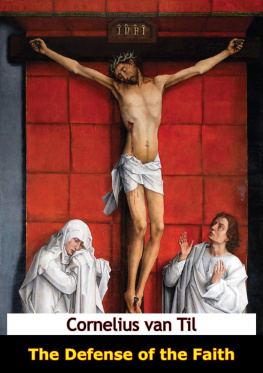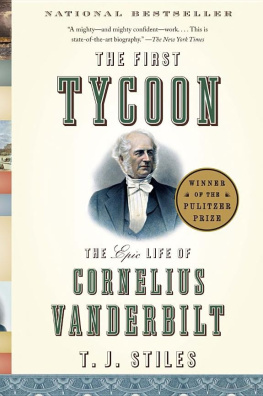T.J. Stiles - The First Tycoon: The Epic Life of Cornelius Vanderbilt
Here you can read online T.J. Stiles - The First Tycoon: The Epic Life of Cornelius Vanderbilt full text of the book (entire story) in english for free. Download pdf and epub, get meaning, cover and reviews about this ebook. year: 2010, publisher: Knopf, genre: History. Description of the work, (preface) as well as reviews are available. Best literature library LitArk.com created for fans of good reading and offers a wide selection of genres:
Romance novel
Science fiction
Adventure
Detective
Science
History
Home and family
Prose
Art
Politics
Computer
Non-fiction
Religion
Business
Children
Humor
Choose a favorite category and find really read worthwhile books. Enjoy immersion in the world of imagination, feel the emotions of the characters or learn something new for yourself, make an fascinating discovery.

The First Tycoon: The Epic Life of Cornelius Vanderbilt: summary, description and annotation
We offer to read an annotation, description, summary or preface (depends on what the author of the book "The First Tycoon: The Epic Life of Cornelius Vanderbilt" wrote himself). If you haven't found the necessary information about the book — write in the comments, we will try to find it.
T.J. Stiles: author's other books
Who wrote The First Tycoon: The Epic Life of Cornelius Vanderbilt? Find out the surname, the name of the author of the book and a list of all author's works by series.
The First Tycoon: The Epic Life of Cornelius Vanderbilt — read online for free the complete book (whole text) full work
Below is the text of the book, divided by pages. System saving the place of the last page read, allows you to conveniently read the book "The First Tycoon: The Epic Life of Cornelius Vanderbilt" online for free, without having to search again every time where you left off. Put a bookmark, and you can go to the page where you finished reading at any time.
Font size:
Interval:
Bookmark:
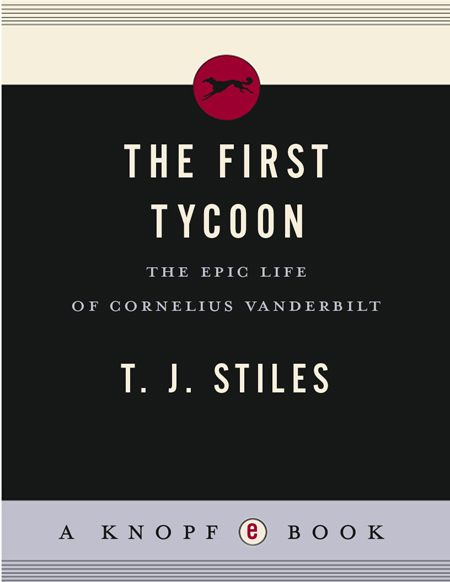
Jesse James:
Last Rebel of the Civil War
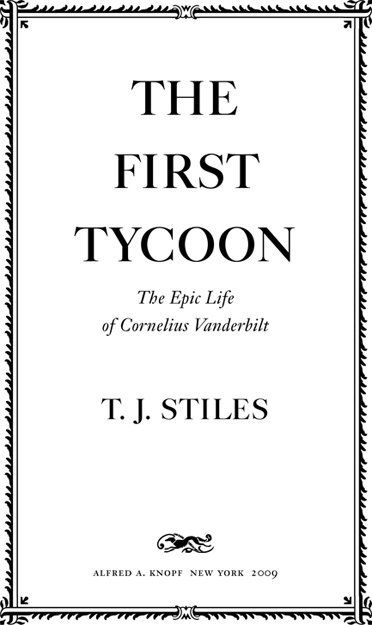
To Jessica and Dillon,
for giving me the future
To understand just one life, you have to swallow the world.
SALMAN RUSHDIE,
Midnight's Children
Part One
Part Two
Part Three
Phebe Vanderbilt
The Quarantine, Staten Island
Sophia Johnson Vanderbilt
Battery Park
The Fly Market
Tontine Coffee House
Thomas Gibbons
Bellona Hall
Destruction of the Lexington
A view of New York
Cornelius Vanderbilt
Daniel Drew
George Law
William H. Vanderbilt's farmhouse
Cornelius Vanderbilt
San Francisco, 1848
Abandoned ships, San Francisco, 1849
Greytown Harbor
San Juan River
San Carlos
Virgin Bay
San Juan del Sur
San Francisco, 1851
The Narrows
Steamship Row
Cornelius K. Garrison
William Walker
Execution of Ponciano Corral
Hipp's Point
Merchants' Exchange
The steamship Vanderbilt
George W. Vanderbilt
William H. Vanderbilt
The steamship Champion
The Merrimack vs. the Monitor
USS Vanderbilt
Cornelius Vanderbilt
Sighting the Alabama
Capture of the Ariel
Harlem Railroad Station, Twenty-sixth Street and Fourth Avenue
Commodore Vanderbilt locomotive
Hudson River Railroad Station, Chambers Street
Horace F. Clark
Augustus Schell
The Albany Bridge
Henry Keep
Erastus Corning
Jay Gould
James Fisk Jr.
Thomas A. Scott
St. John's Park Freight Depot
The Vanderbilt statue
Stock watering (cartoon)
Racing Fisk (cartoon)
Grand Central Depot under construction
Grand Central Depot
Grand Central Depot car house, exterior view
Grand Central Depot car house, interior view
Fast train to Chicago
New York Central & Hudson River Railroad
Fast trotters on Harlem Lane
Mountain Boy
Congress Hall veranda, Saratoga Springs
Cornelius Vanderbilt
Tennessee Claflin
Victoria Woodhull
Horace Greeley
Frank Crawford Vanderbilt
Ethelinda Vanderbilt Allen
Sophia Vanderbilt Torrance
Mary Vanderbilt La Bau
Going to the Opera
The run on the Union Trust
Vanderbilt at rest
Death of Cornelius Vanderbilt
Funeral of Cornelius Vanderbilt
Burial of Cornelius Vanderbilt
Dr. Jared Linsly at the will trial
New York, 1880
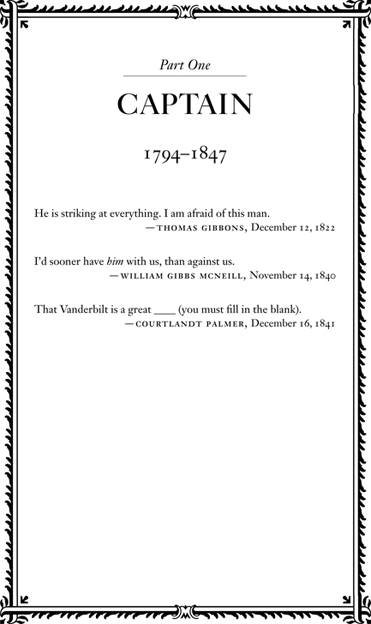
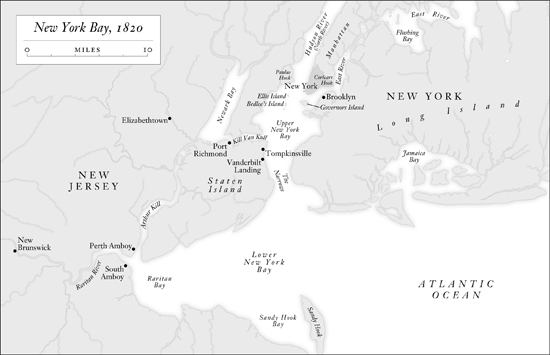

T hey came to learn his secrets. Well before the appointed hour of two o'clock in the afternoon on November 12, 1877, hundreds of spectators pushed into a courtroom in lower Manhattan. They included friends and relatives of the contestants, of course, as well as leading lawyers who wished to observe the forensic skills of the famous attorneys who would try the case. But most of the teeming mass of men and womenmany fashionably dressed, crowding in until they were packed against the back wallwanted to hear the details of the life of the richest man the United States had ever seen. The trial over the will of Cornelius Vanderbilt, the famous, notorious Commodore, was about to begin.
Shortly before the hour, the crowd parted to allow in William H. Vanderbilt, the Commodore's eldest son, and his lawyers, led by Henry L. Clinton. William, glancing carelessly and indifferently around the room, removed his overcoat and comfortably settled himself in his chair, the New York Times reported; meanwhile his lawyers shook hands with the opposing team, led by Scott Lord, who represented William's sister Mary Vanderbilt La Bau. At exactly two o'clock, the judgecalled the Surrogate in this Surrogate Courtstrode briskly in from his chambers through a side door, stepped up to the dais, and took his seat. Are you ready, gentlemen? he asked. Lord and Clinton each declared that they were, and the Surrogate ordered, Proceed, gentlemen.
Everyone who listened as Lord stood to make his opening argument knew just how great the stakes were. THE HOUSE OF VANDERBILT , the Times headlined its story the next morning. A RAILROAD PRINCE'S FORTUNE. THE HEIRS CONTESTING THE WILL. A BATTLE OVER $100,000,000. The only item in all that screaming type that would have surprised readers was the Times's demotion of Vanderbilt to prince, since the press usually dubbed him the railroad king. His fortune towered over the American economy to a degree difficult to imagine, even at the time. If he had been able to sell all his assets at full market value at the moment of his death, in January of that year, he would have taken one
Most of those in that courtroom had lived their entire lives in Vanderbilt's shadow. By the time he had turned fifty he had dominated railroad and steamboat transportation between New York and New England (thus earning the nickname Commodore). In the 1850s, he had launched a transatlantic steamship line and pioneered a transit route to California across Nicaragua. In the 1860s, he had systematically seized control of the railroads that connected Manhattan with the rest of the world, building the mighty New York Central Railroad system between New York and Chicago. Probably every person in that chamber had passed through Grand Central, the depot on Forty-second Street that Vanderbilt had constructed; had seen the enormous St. John's Park freight terminal that he had built, featuring a huge bronze statue of himself; had crossed the bridges over the tracks that he had sunk along Fourth Avenue (a step that would allow it to later blossom into Park Avenue); or had taken one of the ferries, steamboats, or steamships that he had controlled over the course of his lifetime. He had stamped the city with his marka mark that would last well into the twenty-first centuryand so had stamped the country. Virtually every American had paid tribute to his treasury.
More fascinating than the fortune was the man behind it. Lord began his attack by admitting that it seemed hazardous to say that a man who accumulated $100,000,000 and was famous for his strength of will had not the power to dispose of his fortune. His strength of will was famous indeed. Vanderbilt had first amassed wealth as a competitor in the steamboat business, cutting fares against established lines until he forced his rivals to pay him to go away. The practice led the New York Times, a quarter of a century before his death, to introduce a new metaphor into the American vernacular by comparing him to the medieval robber barons who took a toll from all passing traffic on the Rhine. His adventure in Nicaragua had been, in part, a matter of personal buccaneering, as he explored the passage through the rain forest, piloted a riverboat through the rapids of the San Juan River, and decisively intervened in a war against an international criminal who had seized control of the country. His early life was filled with fistfights, high-speed steamboat duels, and engine explosions; his latter days were marked by daredevil harness races and high-stakes confrontations.
Font size:
Interval:
Bookmark:
Similar books «The First Tycoon: The Epic Life of Cornelius Vanderbilt»
Look at similar books to The First Tycoon: The Epic Life of Cornelius Vanderbilt. We have selected literature similar in name and meaning in the hope of providing readers with more options to find new, interesting, not yet read works.
Discussion, reviews of the book The First Tycoon: The Epic Life of Cornelius Vanderbilt and just readers' own opinions. Leave your comments, write what you think about the work, its meaning or the main characters. Specify what exactly you liked and what you didn't like, and why you think so.


